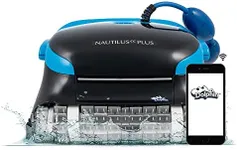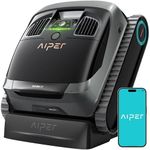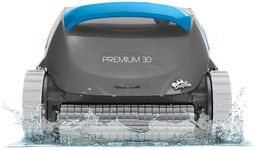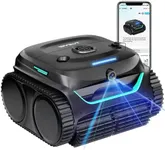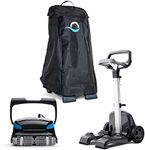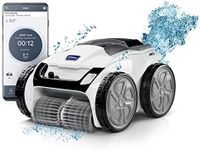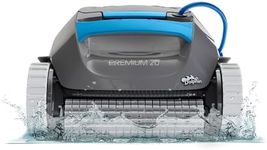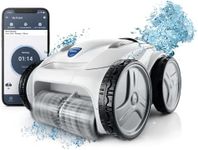Buying Guide for the Best Robotic Pool Cleaner For Fiberglass Pool
Choosing a robotic pool cleaner for your fiberglass pool can make pool maintenance much easier and more efficient. The right cleaner will save you time and effort, keeping your pool sparkling clean with minimal manual work. When shopping for a robotic pool cleaner, it's important to understand the key features and specifications that affect performance, ease of use, and compatibility with your pool type. By focusing on these aspects, you can find a cleaner that matches your pool size, cleaning needs, and personal preferences.Pool Size CompatibilityPool size compatibility refers to the maximum pool length or area that the robotic cleaner can effectively clean. This is important because a cleaner designed for smaller pools may not have the cable length, battery life, or cleaning capacity to handle larger pools. Pool cleaners are often categorized for small, medium, or large pools. For a small pool, a basic model with a shorter cable or battery life may suffice. For medium to large pools, look for cleaners with longer cables or extended battery life. To pick the right one, measure your pool's length and choose a cleaner that is rated for at least that size to ensure complete coverage.
Cleaning Coverage (Floor, Walls, Waterline)Cleaning coverage describes which parts of the pool the robot can clean—just the floor, or also the walls and waterline. This is important because debris and algae can accumulate on all surfaces, not just the floor. Some cleaners only scrub the pool floor, while others can climb walls and clean the waterline. If you want a thorough clean with minimal manual scrubbing, choose a model that covers floor, walls, and waterline. If your main concern is just the floor, a simpler model may be enough.
Filtration SystemThe filtration system refers to how the cleaner collects and traps debris. This is important because a good filtration system will remove both large debris like leaves and fine particles like sand or dust. Filtration systems can range from basic mesh filters to fine cartridge filters. Some models offer interchangeable filters for different cleaning needs. If your pool often has fine debris, look for a cleaner with a fine or ultra-fine filter. If you mostly deal with larger debris, a standard filter may be sufficient. Consider your pool's environment and typical debris when making your choice.
Navigation and Smart FeaturesNavigation and smart features refer to how the robot moves around the pool and whether it uses sensors or mapping technology to optimize cleaning. This is important because advanced navigation can ensure the entire pool is cleaned efficiently, without missing spots or repeating the same area. Basic models may move randomly, while more advanced ones use smart mapping or programmable routes. If you want a quick, thorough clean with less supervision, look for models with smart navigation. If you don't mind a longer cleaning time or occasional missed spots, a simpler model may be adequate.
Ease of Use and MaintenanceEase of use and maintenance covers how simple it is to operate the cleaner, empty the filter, and perform routine care. This is important because a complicated or hard-to-clean robot can become a hassle. Some cleaners have top-access filter baskets and simple controls, while others may require more effort to maintain. If you prefer convenience, look for models with easy-access filters and intuitive controls. If you don't mind a bit more hands-on work, you may have more options to choose from.
Cable or Cordless OperationThis specification refers to whether the robotic cleaner uses a power cable or operates on a rechargeable battery. This is important because cables can sometimes tangle or limit movement, while cordless models offer more freedom but may have limited run time. Corded models are suitable for longer cleaning sessions and larger pools, while cordless models are convenient for smaller pools or quick cleans. Consider your pool size and how much you value convenience versus run time when deciding between corded and cordless options.
Weight and PortabilityWeight and portability refer to how heavy the cleaner is and how easy it is to move and store. This is important because you will need to lift the cleaner in and out of the pool and possibly carry it for storage. Lighter models are easier to handle, especially for frequent use or if you have limited strength. Heavier models may offer more features but can be cumbersome. Think about how often you'll need to move the cleaner and choose a weight that feels manageable for you.
